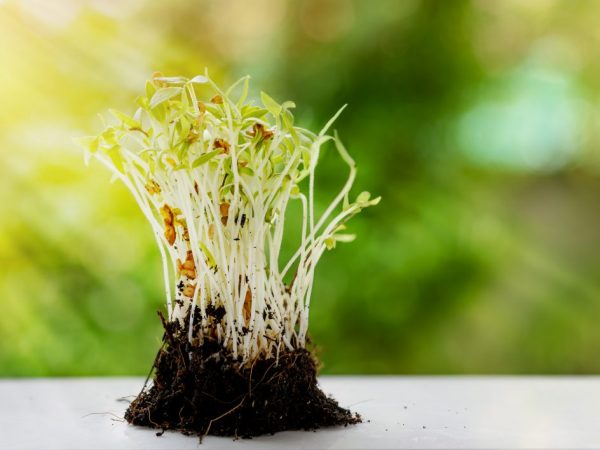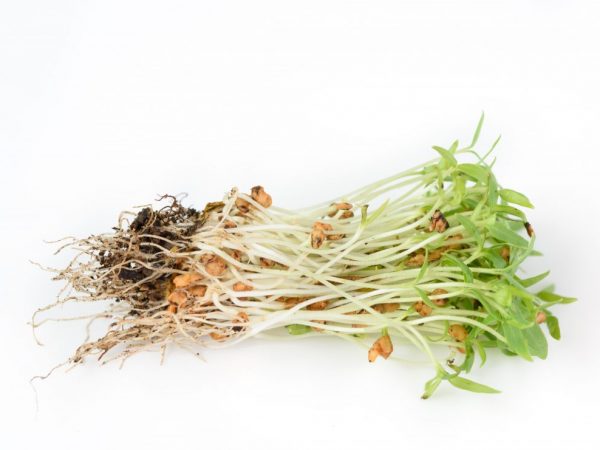Soaking eggplant seeds before planting
To get a good harvest of vegetable crops, planting material is kept in nutrient solutions. This is why it is recommended to soak the eggplant seeds before planting. This will protect the culture from diseases and enrich it with microelements.

Soaking eggplant seeds before planting
Seed selection
Before sowing peppers, cabbage, tomatoes and other vegetable crops, a seed selection procedure is carried out. Different varieties are suitable for each region. The choice of planting material depends on the region where the planting will take place. Each region has its own climatic characteristics.
There are varieties suitable for all regions. This also applies to eggplants. The best plants for beginner gardeners are hybrids. They are characterized by accelerated similarity.
When choosing seeds in stores, they pay attention to expiration dates and packaging. If the seed is spoiled, it is not used for sowing.
Choose eggplant seeds that have been processed:
- pelleting;
- granulation;
- inlaying;
- glazing.
The result of the treatment is the coating of the eggplant seeds with a protective nutritive shell, which is necessary for germination. This allows gardeners to only sow and water the plants, without spending energy on preliminary agrotechnical measures.
Carrying out a complete preparation procedure guarantees excellent germination, strong seedlings and a large yield. It is carried out at home, especially for self-collected planting material. It is stored for six months in a dark place before planting in seedlings or in open ground.
Germination test
Germination test is a way to select high-quality eggplant seeds for sowing. It is carried out for self-assembled specimens. To begin with, all the seeds are examined, sorting is carried out. Good germination is shown by seeds from 3 mm, without deformation.
The selected options are placed in a saline solution for half an hour. To do this, mix 50 g of salt and 1 liter of water so that it completely dissolves. Unsuitable specimens will float to the surface. If all the planting material has surfaced, it is worth trying to germinate it.
For cultivation without germination, eggplant seeds are used, which remained at the bottom of the container. They are washed under running water, dried and sent to the next stages to prepare them for planting.
Soaking technology

soak in prepared water
The soaking procedure produces good seed, which speeds up the germination process. The procedure is suitable for all varieties: early, mid-season and late. Before soaking eggplant seeds, they stock up with settled or melt water collected from pure snow.
For the procedure you will need:
- wide and deep container;
- cotton fabric;
- fertilizers or substances intended for disinfection or growth.
Eggplant seeds are placed between a cloth dipped in fertilizer water.The container is poured so that the fabric is slightly damp, but not waterlogged. Otherwise, there is a risk of spoiling the seed due to lack of air and excess moisture. The container is placed in a warm room without direct sunlight for 2 days. This allows you to get high-quality specimens for seedling and sowing in open ground.
Soaking for disinfection
To increase the plant's immunity to diseases and pests, a disinfection procedure is carried out. The seeds are soaked in different solutions:
- Potassium permanganate. Prepare a 1% pink solution, in which for 20 min. dip the eggplant seeds.
- Hydrogen peroxide. The inoculum is soaked in a 2% solution and kept for up to 7 minutes.
- Aloe. The sap of the plant is taken from a leaf that has stood for 2 days in the refrigerator. Processing lasts a day. After that, the seeds are not washed, but dried, then they begin to plant.
- Baking soda. Mix 10 g of the substance and 1 liter of water, insist half a day.
- Ash. For 2 liters of water use 4 tbsp. l. ash. The mixture is kept for 24 hours, then the liquid is drained and the seeds are placed there for 5 hours.
- Honey. 1 tsp dissolve in a glass of warm water. The seeds are insisted for 5 hours.
- Potato juice. The vegetable is frozen, cut into pieces and squeezed out, in which the seed is kept for 7 hours.
Also use solutions with succinic acid or mustard. To do this, add 15 ml of succinic acid or 100 ml of mustard powder to 1 liter of water. Or they use chemicals:
- Trichodermin;
- Alirin-B;
- "Baktofit";
- "Albite".
Soak for 6 to 12 hours.
After each treatment, the inoculum is washed under water. Only after that is it sown in open ground or for seedlings.
It is important not to increase the concentration of substances in order not to completely destroy the nucleolus. Early plant varieties insist 15 minutes against dry rot, powdery mildew, vascular bacteriosis. in water with a temperature of 50 ° C.
The purpose of the procedure is to protect against bacteria and fungi. If the soil is disinfected, it is absolutely necessary to soak the seeds in such solutions, because the embryos of plants can carry a number of bacteria on the shell. They should also be processed in stimulants for rapid germination.
Soaking in stimulants
Seeds that are processed in growth stimulants germinate quickly. They germinate within a few days after planting. They are purchased in stores in the form of preparations or using folk methods. Chemicals include:
- Energen Aqua;
- Heteroauxin;
- Baikal EM1;
- "Epin-extra";
- "Zircon".
These preparations store nutrients in the seeds for better germination. You can plant such seed the very next day after processing. It germinates 5-6 days after sowing.
In addition to drugs, natural solutions are used. To do this, mix 1 liter of warm and clean water and 5 g of wood ash or sodium humate. The mixture is less effective than the chemicals, but safer if the seeds are overexposed in it.
Conclusion
Eggplants begin to be planted in March. To increase the yield, vegetable seeds are soaked in solutions from a couple of minutes to several days. Chemicals are better suited to stimulate growth, and natural substances are better suited for disinfection. Hardening and processing is carried out not only before planting in open ground, but also for growing seedlings.


